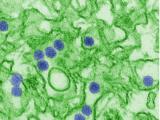Just days after Dallas officials announced a sexually transmitted Zika virus case, the Centers for Disease Control and Prevention (CDC) today released interim guidance on preventing such cases and at the same time updated its guidance for health providers caring for pregnant women who may have been exposed.
Both sets of advice focus tightly on the threat to pregnant women and their babies, given the suspected link between Zika virus and microcephaly, which the CDC said is becoming stronger. The CDC published both documents as early reports on its Morbidity and Mortality Weekly Report (MMWR) portal.
At a media briefing today, CDC Director Tom Frieden, MD, MPH, said mosquito bites are still the primary way Zika virus transmits, but he also fielded questions about two more routes revealed by Brazilian scientists today: saliva and urine. He said so far the CDC has no data on the virus in saliva and urine, so the risk of transmission through those routes isn't clear.
"We're quite literally discovering more about it each and every day," he said, also acknowledging reports this week of blood-transfusion transmission. "We take all reports seriously, but back to the bottom line: This is a mosquito-borne disease."
Infected pregnant women
The CDC said today that it has received seven reports of pregnant women infected with Zika virus: six in the continental United States and one in Puerto Rico. One case of microcephaly, a birth defect marked by an abnormally small head size, was reported earlier in a baby born to women in Hawaii who had lived in Brazil, the outbreak's epicenter, earlier in her pregnancy.
Overall, the CDC is aware of 51 Zika illnesses in the continental United States, 50 of them linked to travel, and 1 of them reflecting the sexual transmission in Dallas.
The CDC has also been notified of 21 cases in Puerto Rico, all but 1 locally acquired. Puerto Rico's governor declared a public health emergency for the Zika virus outbreak, Reuters reported today.
Frieden said one case of Guillain-Barre syndrome (GBS) has been reported among the infected people in the United States, but he cautioned that it could be linked to a number of other known causes, such as influenza illness.
He added that the CDC expects to see many more travel-linked Zika infections in the weeks and months ahead.
Sexual transmission guidance
The CDC said there haven't been any reports of women transmitting Zika virus to their sex partners. Frieden said today's guidance on sexual transmission focuses on the threat to pregnant women or those planning on becoming pregnant.
Men who have lived in or visited Zika-transmission areas and have pregnant sex partners are urged to discuss the potential exposure and any related illness history with the woman and her health provider. Also, men who have traveled to the Zika-affected areas and have pregnant partners should correctly use condoms during all forms of insertive sex or abstain from sex during pregnancy.
Nonpregnant women and men with nonpregnant partners who live in or have traveled to Zika areas and are concerned about sexual transmission of the virus may consider regular condom use or abstaining from sex, the CDC said. Couples weighing the decision to take either of the steps should consider several factors, such as the mild and often asysmptomatic nature of the illness and that the risk of illness depends on how long and how much the person has been exposed to mosquitoes.
Frieden said the guidance doesn't specify how long to take precautions, because so far it's not known how long the virus persists in semen. "It could be weeks to months, " he said, noting that studies are under way but are complex and take time.
The CDC said women who are trying to get pregnant and have sexual partners who traveled or lived in affected countries may consider talking to healthcare providers about testing.
Dallas County health officials announced the sexual transmission case on Feb 2, which involved a person who got sick with Zika virus after having sexual contact with someone who developed symptoms after recent travel to South America.
Updated pregnancy guidance
The CDC's update to its health provider guidance comes less than 3 weeks after it issued its interim document, and the main change is that testing is now recommended for pregnant women without symptoms after returning from areas where Zika virus is circulating.
For that group, the CDC said testing can be offered 2 to 12 weeks after returning from areas with ongoing transmission, based on information about disease levels in the area and local lab capacity.
Frieden said pregnant women who have Zika virus symptoms should be prioritized for testing and that the CDC is working around the clock to get test kits out.
A change in the advice for pregnant women with Zika virus symptoms applies to serial ultrasound frequency. He said the CDC adjusted its guidance after hearing from obstetricians that the protocol in the initial guidance was very challenging.
For women of childbearing age who are at risk of Zika virus transmission, the CDC recommends that providers discuss ways to prevent unintended pregnancy, including family planning counseling and correct use of contraceptive methods.
Senators press Obama for plan
Meanwhile, Senate Democrats, joined by two Independent senators, today sent President Barack Obama a letter asking for a federal strategy to battle Zika virus.
Though mosquito-linked local transmission hasn't been reported in the continental United States, the affected areas are expanding quickly in the Americas, and health officials expect some local transmission clusters in some parts of the United States where the Aedes aegypti mosquitoes that carry the disease are present.
The senators asked the Obama administration to consult with federal department to identify any response gaps and to consider the threat as it allocates resources for the 2016 budget, according to a press release and text of the letter posted today on the Web site of Sen Angus King (I, Maine).
See also:
Feb 5 CDC interim guidelines on sexual transmission
Feb 5 CDC updated interim guidance on pregnant women
Feb 5 CDC press release
Feb 5 Reuters story
Feb 5 Sen King press release















